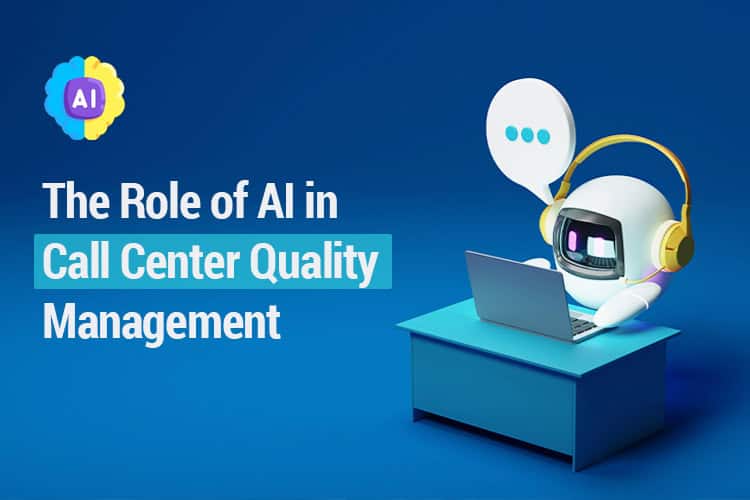Running a call center today isn’t just about answering calls—it’s about delivering fast, efficient service while keeping costs in check and staying compliant with regulations.
- AI Transforms Call Centers: AI automates quality management, analyzing all interactions and improving service.
- Real-Time Insights & Monitoring: AI detects issues instantly, ensuring compliance and better agent performance.
- Automated Scoring & Predictions: AI removes bias, enhances training, and anticipates customer needs.
- Challenges & Future Trends: AI adoption faces costs and resistance, but promises hyper-personalization and smarter support.
Many call centers are still stuck using outdated quality management methods. Manually reviewing calls, randomly selecting interactions for evaluation, and relying on subjective performance scoring might have worked in the past, but they leave too much room for inconsistency.
Worse, they don’t provide a real-time view of what’s actually happening on the floor. Without immediate insights into customer interactions, call centers miss opportunities to improve service, fix issues before they escalate, and create a better experience for both agents and customers. Artificial Intelligence (AI) is changing that.
AI-driven solutions now allow call centers to analyze 100% of interactions, detect performance trends in real-time, and automate key processes that improve both agent productivity and customer satisfaction. By leveraging AI in call center quality management, businesses can monitor and improve key performance indicators (KPIs) such as:
First Call Resolution (FCR) – ensuring issues are resolved on the first call.
Average Handling Time (AHT) – optimizing the time spent on each call.
Customer Satisfaction (CSAT) – understanding how customers feel about interactions.
Net Promoter Score (NPS) – measuring customer loyalty and advocacy.
Compliance Adherence – ensuring regulatory requirements are consistently met.
With AI, call centers can move from reactive management to proactive optimization, significantly improving service quality and customer experience.
Related Article
Salman Aslam
How AI is Revolutionizing Call Center Quality Management
AI-Powered Analytics: Making Smarter Decisions
AI-powered analytics can process vast amounts of call center data, uncovering patterns that would be impossible for humans to detect at scale. Instead of manually reviewing a fraction of calls, AI allows businesses to:
- Monitor and analyze all customer interactionsinstead of relying on limited sampling.
- Detect performance gaps earlyto take proactive measures.
- Identify customer pain pointsand recommend improvements.
- Automate quality assurance, reducing the need for extensive manual reviews.
Automation and Real-Time Monitoring: Staying Ahead of Issues
Real-time monitoring powered by AI ensures that agents receive instant feedback and corrective guidance during live interactions. This minimizes service errors and improves adherence to compliance regulations. AI-driven real-time monitoring enables call centers to:
- Detect compliance risks in real timeand take corrective action.
- Flag policy violations
- Identify coaching opportunitiesbased on AI-driven insights.
- Provide live assistance to agents, improving issue resolution.
AI-Powered Speech and Text Analytics
AI enables deeper insights into customer interactions by analyzing spoken and written communication in ways that traditional monitoring cannot. Some of its key capabilities include:
- Sentiment Analysis:Detects frustration, satisfaction, or confusion based on tone and language.
- Voice Tone Detection:Identifies stress or anger in a customer’s voice, prompting proactive escalation.
- Keyword Spotting: Flags compliance-related terms or recurring customer complaints.
- Conversation Flow Analysis: Recognizes deviations from effective communication structures.
These tools allow supervisors to assess customer interactions at scale, improve agent training, and enhance overall service quality.
Automated Call Scoring and Performance Analysis
Traditionally, scoring calls for quality assurance was done manually—slow, biased, and highly inconsistent. AI-driven automated call scoring eliminates these issues by:
- Evaluating every call based on predefined criteria.
- Reducing human biasin performance evaluations.
- Providing real-time feedbackto agents, improving response times.
- Delivering personalized coaching recommendationsbased on performance trends.
- Identifying top-performing agentsand those needing additional training.
AI ensures that performance assessments are objective, consistent, and data-driven.
“AI is transforming call center quality management by automating call analysis and performance scoring. This shift eliminates subjectivity, allowing managers to focus on meaningful coaching and operational improvements.” – Christian Montes Executive VP of Client Operations, NobelBiz
Predictive Analytics for Customer Satisfaction
AI doesn’t just analyze past calls—it anticipates future customer needs and behaviors. Predictive analytics helps contact centers:
- Spot trends earlybefore they escalate into widespread problems.
- Reduce churnby identifying at-risk customers and offering proactive solutions.
- Enhance personalizationby tailoring interactions based on customer history.
- Improve First Call Resolution (FCR)by analyzing past cases and suggesting solutions before escalation.
By leveraging predictive insights, call centers can deliver faster, more effective customer support, reducing dissatisfaction before it leads to lost business.
Chatbots and Virtual Assistants in Quality Management
AI-powered chatbots and virtual assistants optimize customer service and support by:
- Handling repetitive inquiries, freeing agents to handle complex issues.
- Supporting agents with suggested responses in real-time.
- Ensuring consistency across all communication channels.
- Providing 24/7 assistance, reducing response times outside normal working hours.
Chatbots act as valuable first points of contact, while live agents handle higher-priority or emotionally sensitive interactions.
AI in Workforce Optimization
Workforce optimization powered by AI helps improve scheduling, staffing, and productivity through:
- Smart Scheduling:AI predicts peak times and automatically schedules the right number of agents.
- Workload Balancing:Ensuring agents aren’t overloaded or underutilized.
- Automated Training Recommendations:Identifies agent weaknesses and provides personalized learning modules.
AI helps minimize burnout and maximize productivity by keeping staffing levels balanced and agent performance optimized.
75% of contact centers are prioritizing AI investments over the next 12 months.
Real-Time Monitoring and Alerts
AI continuously monitors interactions and alerts managers about potential issues before they escalate. Benefits include:
- Compliance Violation Detection:Instantly flags problematic interactions.
- Fraud Detection:Recognizes suspicious patterns in conversations.
- Real-Time Agent Support:Provides immediate suggestions for difficult conversations.
Real-time AI monitoring helps businesses stay ahead of risks while ensuring service quality.
AI-Driven Coaching and Training for Agents
Instead of relying on periodic training sessions, AI allows for continuous, personalized coaching by:
- Delivering real-time assistanceduring live calls.
- Suggesting training materialsbased on individual agent weaknesses.
- Providing automated post-call analysisto highlight improvement areas.
This data-driven coaching approach ensures ongoing agent development and better customer interactions.
“AI doesn’t replace human agents; it augments their capabilities. Leading call centers leverage AI strategically to optimize workflows, automate repetitive tasks, and ensure every customer interaction meets high-quality standards.”- Mike Mcguire, Senior Sales Consultant at NobleBiz
Brayan Carpio
Challenges of Implementing AI in Call Centers
While AI delivers powerful benefits, adoption isn’t without its hurdles:
- High Initial Costs:AI implementation requires upfront investment in technology and training.
- Integration Complexities:AI must align with existing software, which can require IT support.
- Employee Resistance:Some agents may fear job loss—proper training and transparency can ease concerns.
Companies must develop a clear AI adoption strategy to navigate these challenges successfully.
Future Trends in AI and Call Center Quality Management
AI in call centers will continue evolving, with trends such as:
- Hyper-Personalization: AI will tailor customer interactions at a highly detailed level.
- Advanced Emotional Intelligence AI: Recognizing emotions and adjusting responses accordingly.
- AI-Driven Predictive Support: Automatically resolving issues before customers contact support.
Final Thoughts: AI is Transforming Call Center Quality Management
AI is reshaping call center quality management by providing real-time insights, automated scoring, and predictive analytics that enhance efficiency, compliance, and customer satisfaction. Companies that embrace AI will gain a significant edge in operational performance.
Upgrade your contact center with AI-powered solutions today!
Explore Omni+ by NobelBiz for a fully integrated, AI-driven contact center platform. Plus, check out NobelBiz Voice Carrier Network for high-quality, reliable voice communications.
FAQs on AI in Call Center Quality Management

Michael McGuire is a contact center industry expert with almost two decades of experience in the space. His experience includes roles as Director of Contact Center Digital Transformation at NobelBiz, and as Director of Operations at FLS Connect, managing multiple call centers. As President of Anomaly Squared and Targeted Metrics, Michael successfully transitioned companies into remote operations and significantly boosted revenues. With a strong background in customer service, leadership, strategic planning, and operations management, Michael excels in driving growth and innovation in the call center space.
Mike is also a proud Board Member for R.E.A.C.H Trade Group, promoting consumer protection and satisfaction and Co-host of the Off Skripted Podcast – a show about Life, Call Centers and everything in between.









